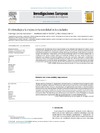Please use this identifier to cite or link to this item:
https://accedacris.ulpgc.es/jspui/handle/10553/42570
| DC Field | Value | Language |
|---|---|---|
| dc.contributor.author | Verano Tacoronte, Domingo | en_US |
| dc.contributor.author | Suárez Falcón, Heriberto | en_US |
| dc.contributor.author | Sosa Cabrera, Silvia | en_US |
| dc.date.accessioned | 2018-11-21T10:10:11Z | - |
| dc.date.available | 2018-11-21T10:10:11Z | - |
| dc.date.issued | 2014 | en_US |
| dc.identifier.issn | 1135-2523 | en_US |
| dc.identifier.uri | https://accedacris.ulpgc.es/handle/10553/42570 | - |
| dc.description.abstract | The introduction of telework in organizations has been used as an example of policy to improve urban mobility, through the reduction in the frequency and duration of trips between home and the workplace. However, telework does not seem to be catching on among businesses and workers, so that the intended improvements are not being achieved. Mobility in urban areas could be improved by increased interest of companies and workers to adopt this way of working, but this is necessary to clarify what is teleworking, what forms have and how they can benefit the parties involved, besides indicating weaknesses and how to minimize them. The ultimate purpose of this paper is to analyze the causes of adoption of telework and its promotion by organizations offering recommendations for proper implementation. | en_US |
| dc.language | spa | en_US |
| dc.publisher | 1135-2523 | |
| dc.relation.ispartof | Investigaciones Europeas de Direccion y Economia de la Empresa | en_US |
| dc.source | Investigaciones Europeas de Direccion y Economia de la Empresa[ISSN 1135-2523],v. 20, p. 41-46 | en_US |
| dc.subject | 5305 Sistemas económicos | en_US |
| dc.subject.other | Teletrabajo | en_US |
| dc.title | Telework and urban mobility improvement | en_US |
| dc.title.alternative | El teletrabajo y la mejora de la movilidad en las ciudades | en_US |
| dc.type | info:eu-repo/semantics/Article | es |
| dc.type | Article | es |
| dc.identifier.doi | 10.1016/j.iedee.2013.03.002 | |
| dc.identifier.scopus | 84894327388 | - |
| dc.contributor.authorscopusid | 11339599500 | |
| dc.contributor.authorscopusid | 56043696000 | |
| dc.contributor.authorscopusid | 8626981800 | |
| dc.description.lastpage | 46 | - |
| dc.description.firstpage | 41 | - |
| dc.relation.volume | 20 | - |
| dc.investigacion | Ciencias Sociales y Jurídicas | en_US |
| dc.type2 | Artículo | en_US |
| dc.date.coverdate | Enero 2014 | |
| dc.identifier.ulpgc | Sí | es |
| dc.description.sellofecyt | Sello FECYT | |
| dc.description.dialnetimpact | 0,0 | |
| dc.description.dialnetq | Q1 | |
| item.grantfulltext | open | - |
| item.fulltext | Con texto completo | - |
| crisitem.author.dept | GIR TIDES: Emprendimiento, Empresa Digital e Innovación | - |
| crisitem.author.dept | IU de Turismo y Desarrollo Económico Sostenible | - |
| crisitem.author.dept | Departamento de Economía y Dirección de Empresas | - |
| crisitem.author.dept | GIR TIDES: Investigación en Turismo y Transporte | - |
| crisitem.author.dept | IU de Turismo y Desarrollo Económico Sostenible | - |
| crisitem.author.dept | GIR TIDES: Emprendimiento, Empresa Digital e Innovación | - |
| crisitem.author.dept | IU de Turismo y Desarrollo Económico Sostenible | - |
| crisitem.author.dept | Departamento de Economía y Dirección de Empresas | - |
| crisitem.author.orcid | 0000-0001-7612-4147 | - |
| crisitem.author.orcid | 0000-0001-5495-9354 | - |
| crisitem.author.orcid | 0000-0002-4993-0730 | - |
| crisitem.author.parentorg | IU de Turismo y Desarrollo Económico Sostenible | - |
| crisitem.author.parentorg | IU de Turismo y Desarrollo Económico Sostenible | - |
| crisitem.author.parentorg | IU de Turismo y Desarrollo Económico Sostenible | - |
| crisitem.author.fullName | Verano Tacoronte, Domingo Manuel | - |
| crisitem.author.fullName | Suárez Falcón,Heriberto | - |
| crisitem.author.fullName | Sosa Cabrera, Silvia | - |
| Appears in Collections: | Artículos | |
SCOPUSTM
Citations
8
checked on Jun 8, 2025
Page view(s) 10
336
checked on Jan 16, 2026
Download(s)
173
checked on Jan 16, 2026
Google ScholarTM
Check
Altmetric
Share
Export metadata
Items in accedaCRIS are protected by copyright, with all rights reserved, unless otherwise indicated.
